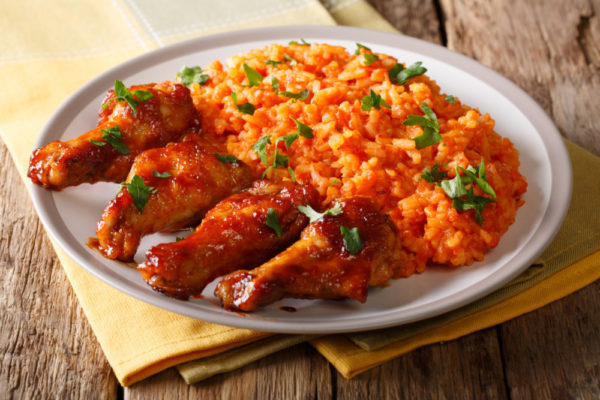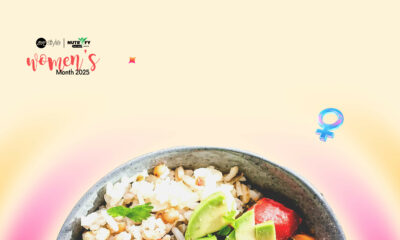Features
Dr. Ezinne Meribe: Can I Lose Weight Eating Nigerian Foods?
 This is a common question I get during live broadcasts on my platform zinnyslifestyle, or as a guest on other platforms. The question comes in different forms ‘I want to lose weight but the foods are not readily available’, ‘I want to lose weight but I don’t know what to eat’. Imagine the confusion a successful woman suddenly has to go through; she can no longer decipher what to eat! This may stem from the fact that a web search for weight loss floods you with Western weight loss programs along with their meals which are far from palatable to your taste buds. For someone like me who can’t go a week without eating something that has lots of pepper, that can be tough.
This is a common question I get during live broadcasts on my platform zinnyslifestyle, or as a guest on other platforms. The question comes in different forms ‘I want to lose weight but the foods are not readily available’, ‘I want to lose weight but I don’t know what to eat’. Imagine the confusion a successful woman suddenly has to go through; she can no longer decipher what to eat! This may stem from the fact that a web search for weight loss floods you with Western weight loss programs along with their meals which are far from palatable to your taste buds. For someone like me who can’t go a week without eating something that has lots of pepper, that can be tough.
I know this because when I decided to lose weight, the few times I tried Google – it always offered meal plans with foreign recipes that my taste buds were not accustomed to. So I had to sit down one day and draw up a meal plan that included foods I loved, foods that I could make using Nigerian ingredients…or at least improvise since I live in Japan. I wanted foods that I would truly enjoy eating and not feel like my soul has been starved.
3 years later I have not gained back that weight. This actually helped me carve a niche when Zinnyslifestyle moved from just being my lifestyle, to taking care of other women who like me loved really good food, tasty Nigerian meals and had no desire to give that up for weight loss.
Now when you think of Nigerian foods, the first thing that comes to mind is probably jollof rice or ‘eba’ & soup – the staples. It does not help that most Nigerian families cook a pot of soup and serve it the whole week with no room for an extra source of vegetables.
The problem with your Nigerian food is
- How you cook them
- How you serve them
- How much you serve.
So, first on how you cook them. Maybe because we don’t naturally use measuring spoons and cups, we just pour in the oil till our eyes or hands are satisfied and that’s it. By the time we are done cooking, our foods are swimming in oil. For some of us, it is so ingrained in us that we can’t enjoy our meal if the oil is not floating and lubricating our lips judiciously. Is the oil bad for you? Yes, there are bad oil; but no, oils like palm oil, coconut oil and olive oil are not bad for you. The problem is the quantity of oil you are cooking with.
Again, when we use deep frying as a method of cooking, we end up doubling the calories in that meal. Now imagine you serve yourself a plate of plantain, chicken and jollof rice; I can bet the plantain and the chicken were fried and we can see the oil oozing. Even with the jollof rice, there is a good amount of oil left on the plate that can very well serve to fry one egg. Notice that with fried egg, frying is not bad, it is the amount of oil you literally soak your egg in that is the problem.
So, what should you be doing instead? Grill your chicken and bake your plantains. Have you noticed that when you grill chicken, oil flows from it freely?
As ‘evidence of good living’, you have you used fried plantain as a side dish instead of vegetables. Can you see the problem with the way this food was served? It is a heavy carbohydrate meal. You may argue that the chicken is protein but then it does not stand to compete with the truck load of carbohydrate on this plate.
Thinking about it, we definitely need a Nigerian food pyramid that offers inclusivity for foods we are familiar with.
The average man needs 2500 calories while the woman needs 2000 calories daily. However, most of us in one sitting will consume at least a thousand calories and then ‘wash it down’ with a bottle of soda. You see where the problem lies? The problem is not in our foods, it is embedded in our eating behaviors.
I don’t encourage calorie counting for my clients but for the purpose of education, let’s do the Math. Note that these are rough estimates. Calories in jollof rice for example would increase or decrease depending on the oil content and other ingredients used.
- An average plate pf jollof rice – 1025 calories
- A piece of fried chicken – 240 calories
- 10 pieces of fried plantain – 670 calories
- A bottle of soda – 184 calories
- TOTAL: 2119
Now I am sure that because this was just lunch, you are bound to have dinner after this and probably a snack or two with another round of soda. Of course, the body always does a good job of clearing any excess amount that it does not need quickly converting it to fat stores.
Again, because a lot of us eat white rice daily some more than once a day without nutritionally balancing the food on our plate, we end up filling our bodies with quick sugar sources that have been stripped of all its fiber and the essential nutrients found in whole grains. This means that we have more fat stores, a greater propensity to eat more cos of the sugar spikes we experience after each meal and so we keep packing up the pounds at 0.1kg per week.
Sometimes I wonder if it has anything to do with the socioeconomic situation; filling up our bellies as much as we can because we have no idea when the next meal will come much more than paying attention to how the foods we eat can influence our health, our nutrition and our longevity. Or maybe it is just plain behavior and we don’t know better. Weekends for example; some people attend two weddings, eat everything they can lay their hands on and even leave with takeaway packs to demolish that evening. Then the next day, another event may come up and the cycle of food demolition continues. With our little or no physical activity lifestyle, we may consume over 8000 calories just on a weekend and where does it all go – our fat stores.
You don’t need any form of imported food or foreign food to lose weight and they are not even healthier than the local alternatives. I know the nutrients in frozen vegetables actually keep well but I avoid buying the ones that have crossed continents. Even if you want to buy already chopped and prepped vegetables, there are a lot of Nigerian vendors who offer that service currently.
Summary – Nigerian foods are a chuck load of nourishment waiting to be devoured and appreciated by you and me. There is absolutely nothing wrong with our foods. And YES, you can lose weight eating Nigerian foods.
PS: I explore the amazing benefits of Nigerian foods on my page zinnyslifestyle every week be sure to check it out.
Photo Credit: © Sergii Koval | Dreamstime.com




















